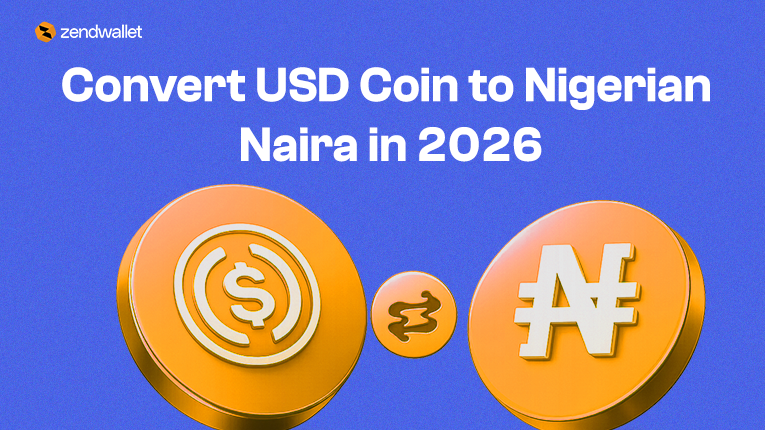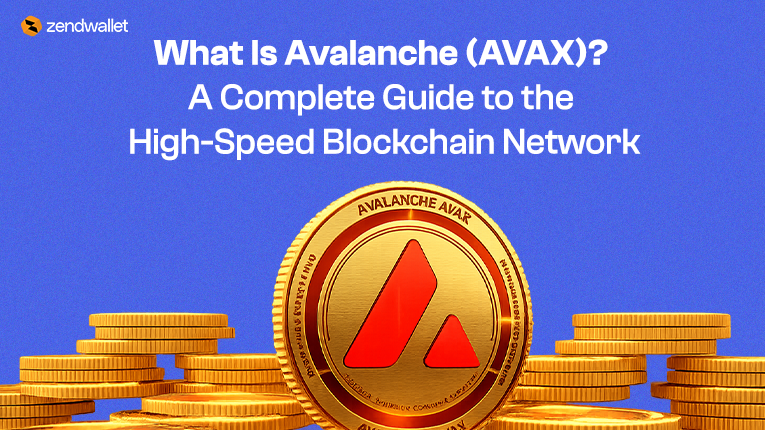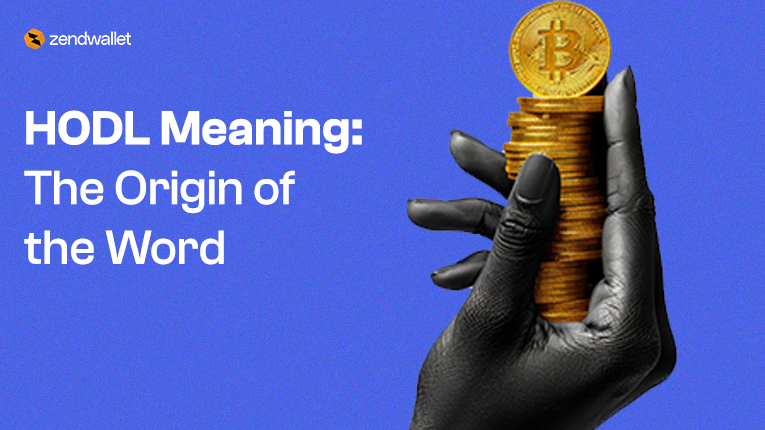Understanding how to store your cryptocurrency safely is one of the most important decisions you will make as a digital asset holder.
How you store your crypto impacts security, control, and convenience. The key choice? Custodial vs. non-custodial wallets
Each wallet type offers a unique set of benefits and trade-offs.
If you’re new to crypto or an experienced trader, understanding the full differences will help you decide which option best suits your needs. Let’s break it down in detail.
What is a Custodial Wallet?

A custodial wallet is a type of cryptocurrency wallet where a trusted third party, such as an exchange or platform, manages and stores your private keys on your behalf.
With a custodial wallet like ZendWallet, you can easily deposit, swap, and withdraw your crypto, without having to manage the technical aspects of blockchain security.
The platform handles everything from key management to transaction security. This means you do not need to worry about misplacing your recovery phrase or setting up complex backups.
You get access to your wallet with a username, password, and multi-factor authentication, while ZendWallet secures your assets behind advanced encryption and monitored systems.
Benefits of Custodial Wallets Like ZendWallet
1. No Key Management Stress
You don’t need to worry about storing long seed phrases, backing up files, or losing access to your funds if a device is lost. ZendWallet manages all of that for you.
2. User-Friendly Experience
ZendWallet is built for simplicity. No blockchain jargon, no complicated setup. Whether you’re a beginner or a seasoned investor, getting started takes minutes.
3. Fast Swaps and Withdrawals
Swap between supported assets directly within your ZendWallet app. Withdraw to external wallets with just a few clicks. We handle the backend, you focus on your goals.
4. Access from Anywhere
ZendWallet is always available. Whether you’re on mobile or desktop, your wallet is synced and secured.
5. Security-First Infrastructure
We prioritize security at every level using encrypted data storage, multi-factor authentication, and advanced monitoring to protect your assets.
Limitations of Custodial Wallets
While custodial wallets offer simplicity and security, they do come with trade-offs:
You don’t control your private keys
Your access to funds depends on the platform’s ability to secure and manage them.
Subject to Regulation
ZendWallet complies with KYC (Know Your Customer) and AML (Anti-Money Laundering) laws. This ensures security and legitimacy, but it also means your account could be frozen under certain legal circumstances.
Dependent on the Provider
In rare cases of platform downtime, insolvency, or policy changes, access to certain assets may be affected temporarily.
What is a Non-Custodial Wallet?

A non-custodial wallet gives you complete control over your private keys and funds.
You are responsible for generating and storing your recovery phrase or private key.
Every transaction must be signed by you, and access to your crypto depends entirely on your ability to keep your credentials safe.
Non-custodial wallets are preferred by users who want full ownership and complete independence from third parties.
However, this also means that if your keys are ever lost or compromised, your crypto cannot be recovered.
You are entirely responsible for every action and every mistake.
Benefits of Non-Custodial Wallets
Complete Control
No middlemen. No intermediaries. You own everything.
Greater Privacy
No KYC requirements. No oversight. You interact with DeFi protocols directly.
Offline Storage (Cold Wallets)
Hardware wallets allow you to store your keys entirely offline, removing the risk of online hacks.
Limitations of Non-Custodial Wallets
High Responsibility
If you lose your seed phrase or private key, there’s no customer support team to help you recover your account.
Steeper Learning Curve
You’ll need to understand gas fees, blockchain explorers, wallet compatibility, and safety protocols.
Inconvenient for Daily Use
Signing every transaction manually or plugging in a hardware wallet every time you interact with a dApp can get tedious.
Key Differences Between Custodial vs. non-custodial wallets

Let us explore the major differences across eight important areas:
1. Control Over Private Keys
The most critical difference between the two types of wallets is who holds the private keys.
With ZendWallet and other custodial wallets, the private keys are securely stored by the platform.
You log in using standard credentials, and the platform takes care of signing transactions and verifying access. This removes the burden of managing cryptographic data and reduces the risk of accidental loss.
With a non-custodial wallet, you generate and store the private keys yourself. These are usually provided as a long alphanumeric code or a list of words called a seed phrase.
Losing this phrase means losing access to your funds permanently, as there is no third party that can retrieve it for you.
2. Responsibility and Risk
Custodial wallets are designed to reduce the risk of user error. When you use ZendWallet, you are trusting a team of experts to safeguard your assets using security protocols, compliance systems, and real-time monitoring.
You can reset your password, recover your account, or get support if something goes wrong.
Non-custodial wallets place all responsibility in your hands. You are your bank. If you misplace your recovery phrase, expose it to phishing attacks, or get hacked, there is no safety net.
The responsibility is total and the consequences are final.
This difference is essential to understand. Custodial wallets offer convenience and protection from human error, while non-custodial wallets require careful self-management and a deep understanding of security practices.
3. Ease of Use
Custodial wallets like ZendWallet are built with simplicity in mind. You can set up your account in minutes, view your crypto balances, and make swaps without learning the technical side of blockchain.
Features like instant transactions, balance tracking, and user-friendly interfaces make them suitable for both beginners and busy users.
Non-custodial wallets are more technical. You will need to understand wallet addresses, gas fees, manual approvals, and possibly even smart contract interaction.
If you want to swap assets on a decentralized exchange, you will have to connect your wallet, sign the transaction, and wait for it to confirm.
For users who prioritize a smooth and convenient experience, custodial wallets are often a better match.
4. Account Recovery and Support
If you ever lose access to your ZendWallet account, recovery options are available.
You can use two-factor authentication, email verification, or support tickets to regain control of your wallet.
This added security means that your funds remain safe even if you forget your password or change your device.
Non-custodial wallets do not have this kind of support. If you lose your private key or seed phrase, you cannot recover your account. There is no username to reset and no customer support to assist you.
This makes custodial wallets the more secure option for users who value peace of mind and reliable customer support.
5. Transaction Process
Custodial wallets handle transactions on your behalf. With ZendWallet, sending, receiving, and swapping crypto is instant and streamlined. You do not need to wait for manual approvals or deal with complex blockchain settings.
In a non-custodial wallet, every transaction must be manually approved by the user. You sign transactions with your private key, pay network fees, and often need to navigate through third-party services to complete swaps or transfers.
This manual process provides full transparency but can be slower and less convenient.
6. Security Practices
Security is a priority for both wallet types, but the approach is different.
ZendWallet invests in strong backend security infrastructure. This includes encrypted storage, biometric verification, real-time fraud detection, and access controls. Your crypto is guarded by experts who work continuously to block threats and maintain compliance.
With a non-custodial wallet, your security depends on your habits. If you use a hardware wallet, store your seed phrase in a safe offline location, and avoid phishing links, your funds can be well protected. However, a single mistake could lead to permanent loss.
So the question is whether you trust your ability to secure your assets more than the protection offered by a professional platform.
7. Privacy and Regulation
Custodial wallets like ZendWallet operate within legal and regulatory frameworks.
This usually includes Know Your Customer verification and compliance with anti-money laundering laws.
While this means your activity may be monitored for security purposes, it also adds a layer of protection for your funds.
Non-custodial wallets offer greater privacy. You do not need to provide identification to set one up, and you can transact directly with others on the blockchain.
However, this freedom comes with fewer safeguards, and users may be more vulnerable to fraud or loss.
Users who value a regulated and protected environment may find custodial wallets more suitable. Those who prioritize privacy and independence may lean toward non-custodial options.
8. Ideal Users
Custodial wallets are ideal for people who want simplicity, support, and strong protection.
ZendWallet is perfect for users who are just starting their crypto journey or who want to manage their assets without getting lost in technical details.
Non-custodial wallets are best for those who want total autonomy and have the experience to manage their security setup.
If you are confident in storing your keys, handling blockchain transactions, and keeping your system secure, you might prefer this route.
Frequently Asked Questions: Custodial vs. non-custodial wallets
What Is a Private Key?
A private key is a secure cryptographic code that proves ownership of a crypto wallet.
Whoever has access to this key has access to the assets inside the wallet. In custodial wallets like ZendWallet, we manage this key securely on your behalf.
Is a Custodial Wallet Safe?
Yes,when you use a trusted and security-focused platform like ZendWallet. While non-custodial wallets eliminate third-party risk, they shift the full burden of security onto you.
Custodial wallets like ZendWallet offer enterprise-grade security measures, such as encryption, fraud monitoring, and two-factor authentication.
Can I Swap Crypto in ZendWallet?
Absolutely. ZendWallet supports seamless crypto swaps within the wallet. You don’t need to transfer to another platform, just log in, choose your assets, and swap.
What Happens if I Forget My Password?
With ZendWallet, you can reset your credentials through our secure verification process. You’re not locked out permanently like in a non-custodial wallet
Final Word: Which One is Right for You?
The choice between a custodial and non-custodial wallet depends on your preferences, goals, and level of experience.
Ask yourself:
Do I want full responsibility for my crypto security?
Or do I prefer the safety and convenience of a platform that manages the hard part for me?
Am I comfortable storing my keys and troubleshooting blockchain issues?
Or would I rather have a dedicated support team and a smooth interface that just works?
At ZendWallet, we believe that crypto should be simple, safe, and accessible to everyone. That is why we provide a powerful custodial wallet that allows you to deposit, swap, and withdraw crypto with confidence.
You get the freedom to manage your assets, while we take care of the complex security behind the scenes.
Also Read: Which Cryptocurrency Wallet is the best



